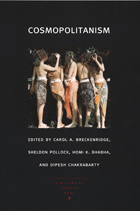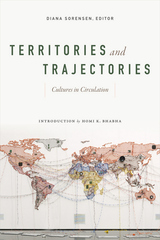4 books about Bhabha, Homi K.

Cosmopolitanism
Carol A. Breckenridge, Sheldon Pollock, Homi K. Bhabha, and Dipesh Chakrabarty, eds.
Duke University Press, 2002
As the final installment of Public Culture’s Millennial Quartet, Cosmopolitanism assesses the pasts and possible futures of cosmopolitanism—or ways of thinking, feeling, and acting beyond one’s particular society. With contributions from distinguished scholars in disciplines such as literary studies, art history, South Asian studies, and anthropology, this volume recenters the history and theory of translocal political aspirations and cultural ideas from the usual Western vantage point to areas outside Europe, such as South Asia, China, and Africa.
By examining new archives, proposing new theoretical formulations, and suggesting new possibilities of political practice, the contributors critically probe the concept of cosmopolitanism. On the one hand, cosmopolitanism may be taken to promise a form of supraregional political solidarity, but on the other, these essays argue, it may erode precisely those intimate cultural differences that derive their meaning from particular places and traditions. Given that most cosmopolitan political formations—from the Roman empire and European imperialism to contemporary globalization—have been coercive and unequal, can there be a noncoercive and egalitarian cosmopolitan politics? Finally, the volume asks whether cosmopolitanism can promise any universalism that is not the unwarranted generalization of some Western particular.
By examining new archives, proposing new theoretical formulations, and suggesting new possibilities of political practice, the contributors critically probe the concept of cosmopolitanism. On the one hand, cosmopolitanism may be taken to promise a form of supraregional political solidarity, but on the other, these essays argue, it may erode precisely those intimate cultural differences that derive their meaning from particular places and traditions. Given that most cosmopolitan political formations—from the Roman empire and European imperialism to contemporary globalization—have been coercive and unequal, can there be a noncoercive and egalitarian cosmopolitan politics? Finally, the volume asks whether cosmopolitanism can promise any universalism that is not the unwarranted generalization of some Western particular.
Contributors. Ackbar Abbas, Arjun Appadurai, Homi K. Bhabha, T. K. Biaya, Carol A. Breckenridge, Dipesh Chakrabarty, Ousame Ndiaye Dago, Mamadou Diouf, Wu Hung, Walter D. Mignolo, Sheldon Pollock, Steven Randall
[more]

Cosmopolitanism
Millennial Quartet IV, Volume 12
Dipesh Chakrabarty
Duke University Press
This final installment of the Millennial Quartet addresses the question of whether cosmopolitanism—ways of thinking, feeling, and acting beyond one’s particular society—is simply the universalism of a Western particular. Assembling scholars from an array of disciplines including English literature and language, romance languages, art history, South Asian studies, and anthropology, this special issue of Public Culture recenters the theory and history of translocal political aspirations and cultural ideas from the traditional Western vantage point to areas outside Europe, such as South Asia, China, and Africa. By examining new archives, framing new theoretical formulations, and suggesting new possibilities of political practice, these essays stretch the term cosmopolitanism to new definitions. On the one hand, cosmopolitanism may be taken to promise a form of supraregional political solidarity, but on the other, it may erode precisely those cultural differences that derive their meaning from a particular place and tradition. Given that most cosmopolitan political formations, from the Roman imperium to European imperialism to contemporary globalization, have been coercive and unequal, can there be a noncoercive and egalitarian cosmopolitan politics? At the most elevated level of conceptualization, while cosmopolitanism may promise a universalism of knowledge, it more typically represents an unwarranted generalization of a European idea or practice.
[more]

Edward Said
Continuing the Conversation
Edited by Homi K. Bhabha and W. J. T. Mitchell
University of Chicago Press, 2005
In Edward Said: Continuing the Conversation, Edward Said's long-time friends and collaborators continue their dialogue with Said where they had left off following his death in the fall of 2003.
The essays, imagining and recalling the cadences of Said's conversation, take various forms, including elaborations on his ideas, applications of his thought to new problems, and recollections of the indescribable electricity that made conversation with him intense and memorable. This lively, personal tone is a direct result of editors Homi Bhabha and W. J. T. Mitchell urging contributors to write in the spirit of a conversation interrupted, a call on hold, a letter waiting for a reply, a question hanging in the air. This is a work of immense imaginative and intellectual force and compelling candor, honoring Said's legacy as an activist intellectual.
This collection includes essays by Lila Abu-Lughod, Daniel Barenboim, Akeel Bilgrami, Paul Bové, Timothy Brennan, Noam Chomsky, Ranajit Guha, Harry Harootunian, Saree Makdisi, Aamir Mufti, Roger Owen, Gyan Prakash, Dan Rabinowitz, Jacqueline Rose, and Gayatri Spivak.
The essays, imagining and recalling the cadences of Said's conversation, take various forms, including elaborations on his ideas, applications of his thought to new problems, and recollections of the indescribable electricity that made conversation with him intense and memorable. This lively, personal tone is a direct result of editors Homi Bhabha and W. J. T. Mitchell urging contributors to write in the spirit of a conversation interrupted, a call on hold, a letter waiting for a reply, a question hanging in the air. This is a work of immense imaginative and intellectual force and compelling candor, honoring Said's legacy as an activist intellectual.
This collection includes essays by Lila Abu-Lughod, Daniel Barenboim, Akeel Bilgrami, Paul Bové, Timothy Brennan, Noam Chomsky, Ranajit Guha, Harry Harootunian, Saree Makdisi, Aamir Mufti, Roger Owen, Gyan Prakash, Dan Rabinowitz, Jacqueline Rose, and Gayatri Spivak.
[more]

Territories and Trajectories
Cultures in Circulation
Diana Sorensen, editor
Duke University Press, 2018
The contributors to Territories and Trajectories propose a model of cultural production and transmission based on the global diffusion, circulation, and exchange of people, things, and ideas across time and space. This model eschews a static, geographically bounded notion of cultural origins and authenticity, privileging instead a mobility of culture that shapes and is shaped by geographic spaces. Reading a diverse array of texts and objects, from Ethiopian song and ancient Chinese travel writing to Japanese literature and aerial and nautical images of the Indian Ocean, the contributors decenter national borders to examine global flows of culture and the relationship between thinking at transnational and local scales. Throughout, they make a case for methods of inquiry that encourage innovative understandings of borders, oceans, and territories and that transgress disciplinary divides.
Contributors. Homi Bhabha, Jacqueline Bhabha, Lindsay Bremner, Finbarr Barry Flood, Rosario Hubert, Alina Payne, Kay Kaufman Shelemay, Shu-mei Shih, Diana Sorensen, Karen Thornber, Xiaofei Tian
Contributors. Homi Bhabha, Jacqueline Bhabha, Lindsay Bremner, Finbarr Barry Flood, Rosario Hubert, Alina Payne, Kay Kaufman Shelemay, Shu-mei Shih, Diana Sorensen, Karen Thornber, Xiaofei Tian
[more]
READERS
Browse our collection.
PUBLISHERS
See BiblioVault's publisher services.
STUDENT SERVICES
Files for college accessibility offices.
UChicago Accessibility Resources
home | accessibility | search | about | contact us
BiblioVault ® 2001 - 2024
The University of Chicago Press









